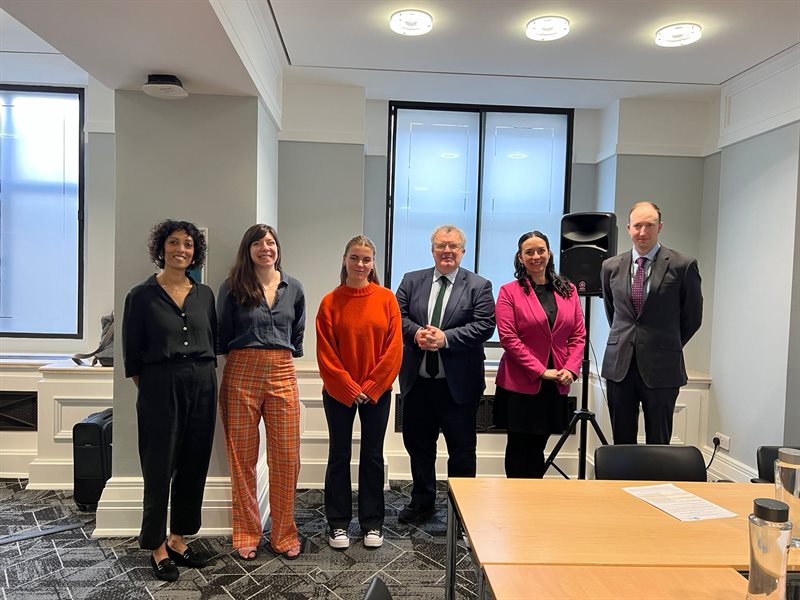University of Nottingham Policy Commission: Delivering a just transition to Net Zero
About the policy commission
In 2024, the University of Nottingham launched a major policy commission to explore how the UK can deliver a just transition to net zero. A just transition is one that is fair, inclusive, and ensures that the benefits of the green economy are shared equitably across society.
This University-led initiative was chaired by Lord Watson of Wyre Forest, former Deputy Leader of the Labour Party and Honorary Professor at the University, and deputy chair Professor Lucelia Rodrigues, Chair of Sustainable and Resilient Cities.
The commission was supported by the University’s Institute for Policy and Engagement and built on Nottingham’s global leadership in net zero research and innovation. From green aviation and transport to low-energy buildings, through initiatives such as our Zero Carbon Cluster, and hydrogen energy through the HyDEX programme, the University continues to deliver solutions that influence both policy and industry.
Why a just transition?
Achieving a net zero economy will take extraordinary technological innovation but technology alone is not enough. People – how we live, work, travel and consume – will also need to change dramatically. In any change as far-reaching as this, it’s inevitable that some people, some places and some communities face greater challenges and risks than others. But without wide support, achieving the transition to Net Zero will be even more difficult.
Governments need to be aware of where there is a risk of unjust sharing of the benefits and risks of the transition – and be ready to support those who stand to lose most.This is a complex question, requiring input from a wide range of academic disciplines as well as from those delivering change on the ground. Our goal with our Policy Commission is to help Government work through this wide range of invaluable expertise sources to identify actionable policy proposals.
As the climate crisis intensifies and public debate around the costs, trade-offs, and pace of the net zero transition continues to grow, the need for urgent yet equitable action has never been more critical. The Intergovernmental Panel on Climate Change has made it clear: delaying action will only worsen the consequences, even if net zero targets are ultimately met.

While action is essential, it cannot come at the expense of fairness. Recent concerns from trade unions, policymakers, and communities point to a growing disconnect between the goals of decarbonisation and the lived experiences of those affected. Jobs, affordability, and local empowerment are all on the line — and must be central to how the UK approaches its transition.
The commission set out to address this challenge.
Evidence gathering and final recommendations
Over the course of 2024, the Commission brought together expert witnesses from academia, business, local government, trade unions, and civil society to explore three key questions:
In November 2024, the Commission’s work culminated in a final report titled Delivering a Just Energy Transition, which was launched in Parliament. The report outlines six clear and practical recommendations for government to help maintain and grow public support for the transition to net zero:
-
Continue to form a positive narrative around decarbonisation to garner public support.
-
Set up Transition Taskforces to give those impacted by the energy transition a real say in shaping policy.
-
Utilise the Industrial Strategy to deliver a just transition, learning from global best practice to maximise jobs, investment, and opportunity.
-
Ensure an enhanced focus on the local benefits of hosting new energy infrastructure.
-
Introduce wider planning reforms that facilitate community engagement and long-term net zero goals.
-
Support skills and workforce transformation, equipping people and places for the green economy.
The commission’s message is simple but powerful: climate action must be fast — but it must also be fair. The University of Nottingham is proud to have led this work and remains committed to shaping the policies and practices needed for a sustainable, inclusive future.
Read the full report
Commission members
The members of the Commission were as follows:
- Lord Tom Watson (Chair)
- Lucelia Rodrigues, University of Nottingham (Deputy Chair)
- Anna Markova, Trades Union Congress
- Corall Jenkins, Nottingham City Council
- Faye McAnulla and Sharon George, HyDEX
- Gudrun Cartwright, Business in the Community
- Louis Willis, European Climate Foundation
- Marie-Laure Hicks, Aldersgate Group
- Michael Gallagher, Midlands Net Zero Hub
- Natasha Dhumma, National Union of Students
- Peter Holbrook, Social Enterprise UK
- Richard Blackmore, East Midlands Chamber of Commerce
- Stephen Meek, University of Nottingham
- Sarah Metcalfe, University of Nottingham
Find out more and get involved
For more information, get in touch, follow us on social media or check out our blog where we post regular updates about what we do, including our next steps as we continue to support the vital work outlined in this commission.